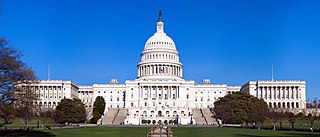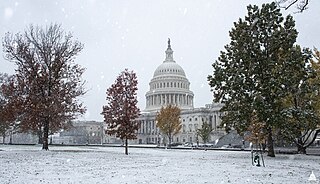
The Senate Majority and Minority Leaders are two United States Senators and members of the party leadership of the United States Senate. These leaders serve as the chief Senate spokespeople for the political parties respectively holding the majority and the minority in the United States Senate, and manage and schedule the legislative and executive business of the Senate. They are elected to their positions in the Senate by the party caucuses: the Senate Democratic Caucus and the Senate Republican Conference.

Craig Lyle Thomas was an American politician who served as United States Senator from Wyoming from 1995 to 2007. He was a member of the Republican Party. In the Senate, Thomas was considered an expert on agriculture and rural development. He had served in key positions in several state agencies, including a long tenure as Vice President of the Wyoming Farm Bureau from 1965 to 1974. Thomas resided in Casper for twenty-eight years. In 1984, he was elected from Casper to the Wyoming House of Representatives, in which he served until 1989.

Steny Hamilton Hoyer is an American attorney and politician serving as U.S. Representative for Maryland's 5th congressional district since 1981 and as House Majority Leader since 2019. A Democrat, he was first elected in a special election on May 19, 1981, and is currently serving in his 20th term. The district includes a large swath of rural and suburban territory southeast of Washington, D.C. Hoyer is the dean of the Maryland Congressional delegation.

The One Hundred Tenth United States Congress was a meeting of the legislative branch of the United States federal government, between January 3, 2007, and January 3, 2009, during the last two years of the second term of President George W. Bush. It was composed of the Senate and the House of Representatives. The apportionment of seats in the House was based on the 2000 U.S. Census.
The United States Senate Democratic Conference Secretary, also called the Caucus Secretary, is a ranking leadership position within the Democratic Party in the United States Senate. It was previously considered the number-three position, behind the party's floor leader and the party's whip, until in 2006, when Democratic leader Harry Reid created the new position of Vice-Chairman of the caucus. Now, the secretary is the fourth-highest ranking position. The conference secretary is responsible for taking notes and aiding the party leadership when senators of the party meet or caucus together.
The House Democratic Caucus is a congressional caucus composed of all Democratic Representatives in the United States House of Representatives and is responsible for nominating and electing the Democratic Party leadership in the chamber. In its roles as a party conference, the caucus writes and enforces rules of conduct and discipline for its members, approves committee assignments, and serves as the primary forum for development of party policy and legislative priorities. It hosts weekly meetings for these purposes and to communicate the party's message to members. The caucus has a Caucus Chairman and Caucus Vice-Chair.

The Democratic Caucus of the United States Senate, sometimes referred to as the Democratic Conference, is the formal organization of all senators who are part of the Democratic Party in the United States Senate. For the makeup of the 116th Congress, the conference additionally includes two independent senators who formally caucus with the Democrats for the purpose of committee assignments and structural organization, bringing the current total to 47 members. The central organizational front for Democrats in the senate, its primary function is communicating the party's message to all of its members under a single banner.
The Utah Democratic Party works to elect Democrats to office in the state of Utah. The Utah Democratic Party, like other national, state, and county parties, maintains a party platform that lists general principles or issues of importance to members of the Party and maintains a party organization at the state level.
In U.S. politics an Independent Democrat is an individual who loosely identifies with the ideals of the Democratic Party but chooses not to be a formal member of the party. Independent Democrat is not a political party. Several elected officials, including members of Congress, have identified as Independent Democrats.

Jill Lynette Long Thompson is an American politician and educator. A former Congresswoman from Indiana, she teaches ethics as a Visiting Associate Clinical Professor at the Kelley School of Business and the School of Public and Environmental Affairs at Indiana University Bloomington. Until 2015 she was board chair and CEO of the Farm Credit Administration, a position to which she was appointed by President Barack Obama in 2009. Long Thompson completed her tenure there in March 2015. The first person in her family to graduate from college, she earned a B.S. Degree in business administration at Valparaiso University and an M.B.A. and Ph.D. in business at Indiana University. She is a member of the Democratic Party.

The Massachusetts Democratic Party (MassDems) is the affiliate of the Democratic Party in the U.S. Commonwealth of Massachusetts. The state party chairman is Gus Bickford. The party is currently the most powerful political party in the state, dominating its statewide elected offices, and holding veto-proof super-majorities in the state legislature.

The One Hundred Fourteenth United States Congress was a meeting of the legislative branch of the United States federal government, composed of the United States Senate and the United States House of Representatives. It met in Washington, D.C. from January 3, 2015, to January 3, 2017, during the final two full years of Barack Obama's presidency. The 2014 elections gave the Republicans control of the Senate for the first time since the 109th Congress. With 248 seats in the House of Representatives and 54 seats in the Senate, this Congress began with the largest Republican majority since the 71st Congress of 1929–1931.

The 116th United States Congress is the current meeting of the legislative branch of the United States federal government, composed of the Senate and the House of Representatives. It convened in Washington, D.C. on January 3, 2019, and will end on January 3, 2021, during the third and fourth years of Donald Trump's presidency. Senators elected to regular terms in 2014 are finishing their terms in this Congress and House seats were apportioned based on the 2010 Census.
According to their official website, the Senate Democratic Steering and Outreach Committee (DSOC) is a committee dedicated to fostering dialogue between Senate Democrats and community leaders across the nation. The Steering Committee hosts several meetings each year with advocates, activists, policy experts, and elected officials to help the structuring of the Democrats' agenda in the United States Senate.

Donald W. Norcross is the current U.S. Representative for New Jersey's 1st congressional district, serving since 2014. The district serves much of the core of the New Jersey side of the Philadelphia metro area, including Camden, Cherry Hill, Lindenwold and Glassboro. He is a member of the Democratic Party and an American labor leader. He won the seat in 2014 following the resignation of Rob Andrews. Prior to his service in the House, he represented the 5th District in the New Jersey Senate from 2010-14.
Fernando Cabrera is an American politician in the Bronx, New York. A Democrat, he currently represents the 14th District in the New York City Council, including the neighborhoods of Claremont Village, Fordham, Kingsbridge, Marble Hill, Morris Heights, Mount Eden, Mount Hope and University Heights.

The 1894 United States elections was held on November 6, and elected the members of the 54th United States Congress. These were mid-term elections during Democratic President Grover Cleveland's second term. The Republican landslide of 1894 marked a realigning election In American politics as the nation moved from the Third Party System that had focused on issues of civil war and reconstruction, and entered the Fourth Party System, known as the Progressive Era, which focused on middle class reforms.

The One Hundred Seventeenth United States Congress is the next meeting of the legislative branch of the United States federal government, composed of the United States Senate and the United States House of Representatives. It is scheduled to meet in Washington, D.C. from January 3, 2021 to January 3, 2023. The elections of November 2020 will decide control of both houses.











